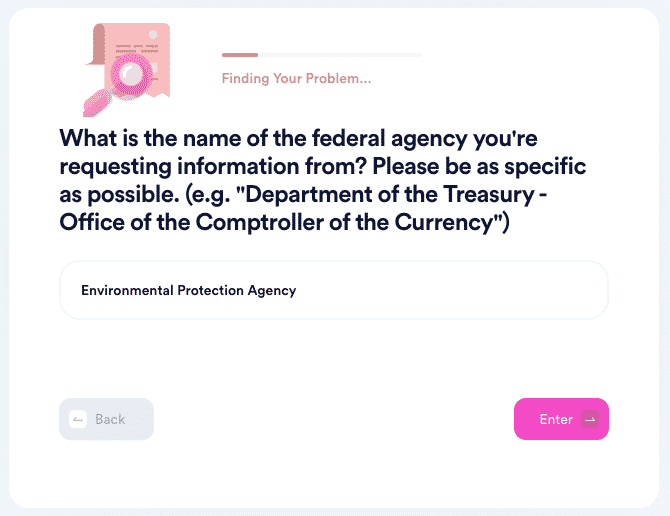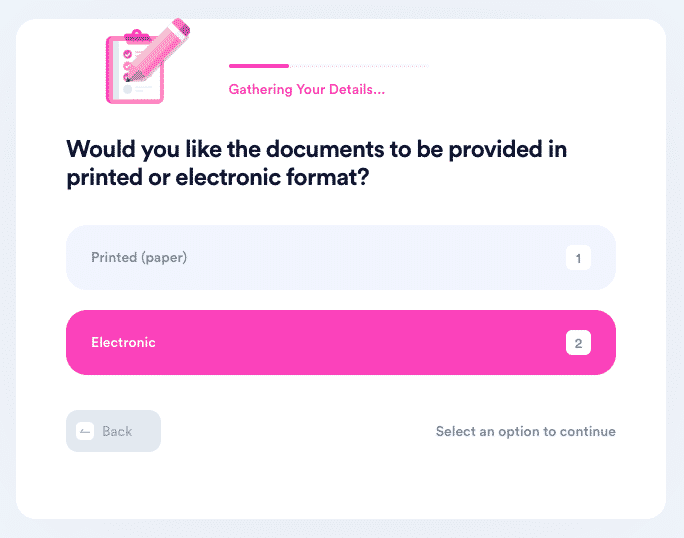A FOIA Request Form and Other Ways of Filing a FOIA Request
Filing a FOIA request is no easy feat. It implies that you are familiar with the agency that has your records and everything that the Freedom of Information Act (FOIA) covers. Government agencies often look for excuses to deny your request, so it is useful to know whether to use a FOIA request form or write a FOIA request letter.
If you want to request a public record from a government agency, you are in the right place. DoNotPay will explain what your FOIA request should look like and what it must include.
How To Make a FOIA Request
The FOIA is a law that allows the public to request insight into federal records. Federal agencies have to disclose all records except those that fall under nine exemptions and three exclusions because such info influences personal privacy, law enforcement, or national security.
If you are interested in filing a request, you must be sure which agency has the info you need and what approach you need to take. Before you file a request, you should:
- Determine the exact record you are looking for—an email, video, document, or voice message
- Browse the internet to find out if the records you are seeking are already in the public domain
- Narrow down the choice of locations of the record via the official U.S. government website
- Provide the required information on your FOIA request
- Send a letter, write an email, submit an online form, or file a FOIA request letter to the identified agency
Is There a Federal FOIA Request Form I Can Use?
Every federal agency sets its regulations and ways for submitting a FOIA request. You could search the list of federal agencies and find out how to make a request and what information you should include.
Some federal agencies provide an online request form you can fill out and submit. While an online form is an option, writing your FOIA request letter is a more reliable way of getting the documents you need. A request letter provides a personal tone to your request and gives you the freedom to describe the information you seek in more detail.
If you wish to write a request letter and send it via email, some FOIA request templates can come in handy.
What Should a FOIA Request Letter Include?
The requirements for your request letter depend on the type of request you are making.
Take a look at the table below for a more specific idea:
| FOIA Request Letter Requirements | |
| A FOIA Request Letter Should Include | A FOIA Request Letter Mustn’t Contain |
|
|
While sample letters can help, creating a FOIA request letter by yourself is not an easy task. There is always a chance that you will omit some crucial piece of information or not provide a detailed enough description of the document you want.
If you are not willing to take your chances, you could use some professional assistance in the form of DoNotPay!
How To File a FOIA Request With DoNotPay
With the help of DoNotPay, the chances of any federal agency denying your FOIA request are next to zero! Our extensive database covers not only federal but also state and local agencies. We will take the burden off your back and create a letter on your behalf, provided you perform a few easy steps first:
- Access DoNotPay from your
- Specify whether you are looking for a federal or state agency
- Enter the agency name, document name, or the information you wish to request
- Indicate whether you want to obtain a fee waiver or expedited processing

If your request gets denied, you can turn to us and discover how to file a FOIA appeal. Check out our FOIA learning center for information on FOIA fees or filing a FOIA request on yourself.

DoNotPay Can Help You Send FOIA Requests to Any Agency!
DoNotPay’s knowledge base is an invaluable source of FOIA-related information. We can give you access to Navy and Army FOIA regulations and help you send them a request letter. You can find out how to conduct a FOIA search and what the average FOIA response time is.
Use ’s help to send a request to other agencies, such as:
- State Department
- Internal Revenue Service (IRS)
- Central Intelligence Agency (CIA)
- Food and Drug Administration (FDA)
- Federal Bureau of Investigation (FBI)
- Customs and Border Protection (CBP)
- Immigration and Customs Enforcement (ICE)
- Office of Biometric Identity Management (OBIM)
- Equal Employment Opportunity Commission (EEOC)
- The United States Citizenship and Immigration Services (USCIS)
DoNotPay Leads the Way Against Spammers
Browsing the internet has never been more popular than today, but you must not forget to keep your private and financial information safe. You know you can cancel any streaming service or magazine subscription easily, but that won't stop them from using your personal details for marketing purposes.
DoNotPay has a solution for that!
Is a company pestering you with incessant robocalls, spam emails and text messages? Use our Virtual Credit Card to catch them in the act and claim compensation for your troubles.
To prevent that from happening ever again, use our card to sign up for free trials—not only will you not pay a dime for the service, but you will be automatically unsubscribed as soon as the trials are up!
If you want to avoid revealing your personal phone number, we'll generate a temporary burner phone for you so the company won't have any way to reach you.
Already Been Scammed? DoNotPay Knows the Way!
If you've already made the mistake and divulged your personal info to the wrong party or experienced any other kind of crime or injustice, you don't have to sit tight and suffer the consequences. DoNotPay can assist you in taking anyone to small claims court!
We'll help you gather evidence—correspondence proving stalking or harassment took place, customer service call recordings, denied chargeback and refund claims, online fax transcripts, or proof of copyright violation. Then, we'll fill out the relevant documents for you and draft a court script that you can use in your hearing.


